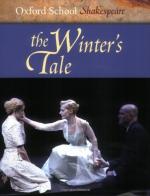|
This section contains 4,492 words (approx. 15 pages at 300 words per page) |

|
SOURCE: "Hermione's Trial in 'The Winter's Tale'," in Essays in Theatre, Vol. 3, No. 1, November, 1984, pp. 3-12.
In the following essay, Bergeron argues that Hermione's trial in The Winter's Tale reflects a triumph of rationality over passion.
When Leontes and the others gather in the final scene of The Winter's Tale before the statue of Hermione, Paulina instructs them:
It is requir'd
You do awake your faith. Then all stand still:
Or—those that think it is unlawful business
I am about, let them depart.
(V.iii.94-97)1
In a moment the music sounds and the statue moves. Puzzling, perhaps, is Paulina's word "unlawful". Robert Uphaus has argued that this word is appropriate because The Winter's Tale creates much "unlawful business;" it is "Shakespeare's most defiant romance."2 The play continually violates our expectations. The most explicit example of defiance comes in Hermione's trial in Act III, a scene that...
|
This section contains 4,492 words (approx. 15 pages at 300 words per page) |

|


